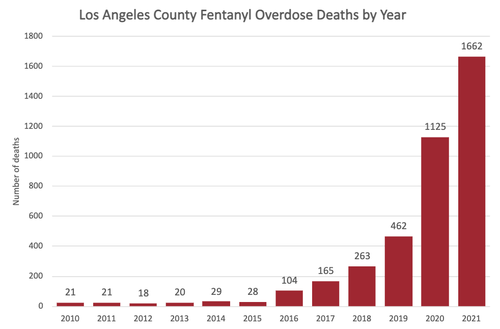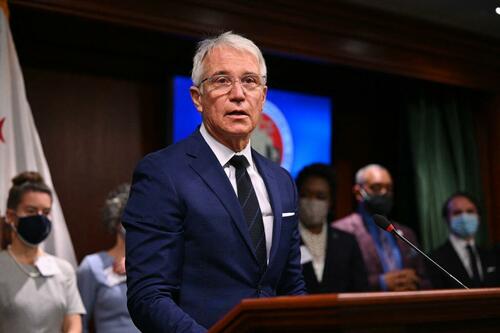
Between 2016 and 2016, Los Angeles County experienced a 1,280% spike in overdose deaths from fentanyl, according to a recent report from the county Department of Public Health.

In a joint statement, the LA County District Attorney's Office (which regularly refuses to charge drug dealers) and the health department announced the creation of a working group to address the situation "through prevention, education and enforcement."
The 'enforcement' part will of course mark a radical departure from DA George Gascón's 'catch-and-release' policy when it comes to criminals.
According to the health department, there were 104 deaths in 2016 attributed to fentanyl, which ballooned to 1,662 in 2001.

According to City News Service, black residents had the highest overdose rate based on the population, at 30.6 per 100,000 residents. White residents are overdosing at a rate of 22.5 per 100,000, while Latinos are at 11.1 per 100,000 residents.
The overdoses also occurred much more frequently in less affluent areas - which came in at 38.4 deaths per 100,000 vs. 12.3 per 100,000.
"Fentanyl overdoses are a significant and growing public health problem across the United States and in [the county], across sociodemographic groups and geographic areas," reads the report, which adds "The increases among youth and the widening inequities between under-resourced and more affluent groups underscore the need to target prevention efforts to those at highest risk to decrease fentanyl overdoses and advance health equity in [LA County]."
Gascón, acting like he isn't a huge part of the problem, said in a statement that the working group is "bringing together the county’s public health experts, education leaders, community advocates, and law enforcement professionals to support and utilize evidence-based and effective approaches to stopping the toll fentanyl is taking,” Gascón said in a statement."
Between 2016 and 2016, Los Angeles County experienced a 1,280% spike in overdose deaths from fentanyl, according to a recent report from the county Department of Public Health.

In a joint statement, the LA County District Attorney’s Office (which regularly refuses to charge drug dealers) and the health department announced the creation of a working group to address the situation “through prevention, education and enforcement.”
The ‘enforcement’ part will of course mark a radical departure from DA George Gascón’s ‘catch-and-release’ policy when it comes to criminals.
According to the health department, there were 104 deaths in 2016 attributed to fentanyl, which ballooned to 1,662 in 2001.

According to City News Service, black residents had the highest overdose rate based on the population, at 30.6 per 100,000 residents. White residents are overdosing at a rate of 22.5 per 100,000, while Latinos are at 11.1 per 100,000 residents.
The overdoses also occurred much more frequently in less affluent areas – which came in at 38.4 deaths per 100,000 vs. 12.3 per 100,000.
“Fentanyl overdoses are a significant and growing public health problem across the United States and in [the county], across sociodemographic groups and geographic areas,” reads the report, which adds “The increases among youth and the widening inequities between under-resourced and more affluent groups underscore the need to target prevention efforts to those at highest risk to decrease fentanyl overdoses and advance health equity in [LA County].”
Gascón, acting like he isn’t a huge part of the problem, said in a statement that the working group is “bringing together the county’s public health experts, education leaders, community advocates, and law enforcement professionals to support and utilize evidence-based and effective approaches to stopping the toll fentanyl is taking,” Gascón said in a statement.”








